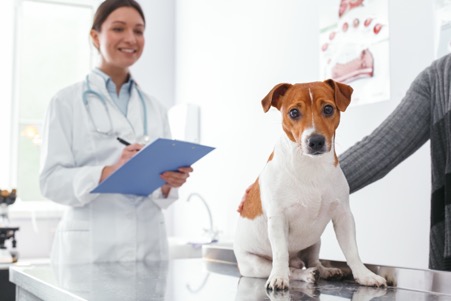What are heartworm treatment options?

Although preventatives are widely available, a surprising number of domestic animals are still diagnosed with heartworms each year. This internal parasite lives inside the blood vessels of your pet's heart and lungs, deriving their nutrients from his blood and body at his expense.
If your pet has been diagnosed with heartworms, prompt treatment is essential if you are to limit the damage that this parasitic infestation can do to his health. It could even safe his life
No two pets are the same and for this reason, exactly which heartworm treatment is best for your pet will depend on his individual circumstances. This is where having an experienced veterinarian in Port Charlotte, FL is extremely valuable, as they will be able to use their knowledge of heartworm medications and your pet's history to determine which is most suitable.
Obtaining a diagnosis of heartworms
Before any treatment can begin, your veterinary team at Charlotte Animal Hospital will need to confirm the diagnosis of heartworms. This will help us to ensure that your pet is being treated for the right problem. It will also enable us to see exactly how severely your pet has been affected.
To obtain a diagnosis, several things need to happen. Firstly, blood tests will be carried out which will check for the presence of certain proteins produced by female heartworms. This is known as an antigen test. In addition to this, we may also require
- A urinalysis.
- X-rays or radiographs which will let us see the shape and size of your pet's heart. This is valuable since many animals with severe heartworm infections develop enlarged pulmonary arteries or suffer from visible obstructions in the arteries.
- Ultrasounds which will allow us to view the internal structures of the heart and surrounding blood vessels to check how well the heart is functioning.
Treatment options for heartworms
Treatment for heartworms tends to fall into three different areas. These are:
Restricting exercise
This needs to happen as soon as your pet is diagnosed with heartworms and should continue until he has been proven to be free from the parasite and your veterinarian has given their approval for exercise to recommence. Exercise restriction is important since any physical exertion places pressure on the heart and lungs - the two areas of the body most affected by heartworms. Damage to them can reduce how well they function, and this could put your furbaby at risk of complications such as a stroke or a heart attack.
Medication
In most instances, multiple medications will be used to treat a heartworm infestation. These include injections that target and kill the adult heartworms, as well as doxycycline and prednisone to reduce side effects and a heartworm preventative medication to destroy any microfilaria (heartworm larvae). In addition to these, if your pet has been severely affected by heartworms, he may need treatments such as antibiotics, IV fluids and beta-blockers to help restore his health.
It is important to note that heartworm injections that kill off adult heartworms must be given in a number of smaller doses. Your veterinarian will destroy the heartworms gradually as their bodies still contain bacteria which will be released into your pet's bloodstream when they die. Too much of these bacteria could have adverse consequences for your pet. Similarly, the bodies of the heartworms must be excreted by your pet's own body, and this can take time. Killing too many adult heartworms at once has been shown to cause a pet to go into shock and professionals agree that it is better to eradicate them in several sessions.
Surgery
If your dog has been diagnosed with a particularly severe case of heartworms, it may be necessary for our veterinarian to surgically remove the worms from his heart and the blood vessels of the lungs.
Our experienced veterinarians in Port Charlotte, FL will be able to guide you and your precious pet through the treatment process, supporting you both every step of the way.
If you suspect that your pet may need treatment for heartworms, call Charlotte Animal Hospital at 941-214-4250 to schedule testing speak with an experienced vet about heartworm prevention or treatment options.

